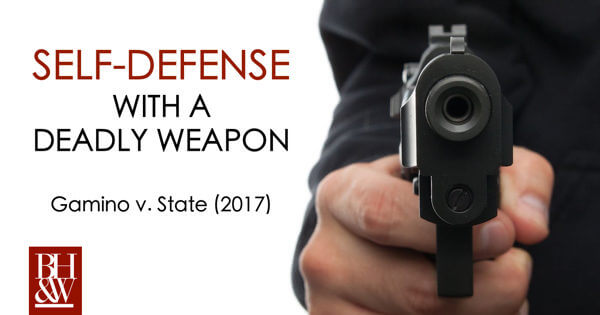 Under Chapter 9 of the Texas Penal Code, self-defense is provided as a justification to the offense of murder (among others). Chapter 9 makes clear that if a fact-finder believes a defendant’s actions are justified, the fact-finder may not convict for an offense based on those self-defense actions. In essence, a defendant that pleads self-defense is telling the fact-finder that he intentionally performed certain actions in order to protect himself against the unlawful actions of another. So…if the defendant intentionally performed the self-defensive actions, can self-defense be applied to an offense like manslaughter that requires “reckless” conduct vice intentional?
Under Chapter 9 of the Texas Penal Code, self-defense is provided as a justification to the offense of murder (among others). Chapter 9 makes clear that if a fact-finder believes a defendant’s actions are justified, the fact-finder may not convict for an offense based on those self-defense actions. In essence, a defendant that pleads self-defense is telling the fact-finder that he intentionally performed certain actions in order to protect himself against the unlawful actions of another. So…if the defendant intentionally performed the self-defensive actions, can self-defense be applied to an offense like manslaughter that requires “reckless” conduct vice intentional?
In Alonzo v. State, the 13th District Court of Appeals (Corpus Christie) “believed it is illogical for a defendant to argue self-defense when charged with an offense whose requisite mental state is recklessness.” The Texas Court of Criminal Appeals, however, disagrees, explaining that “there is nothing in Penal Code Section 2.03 or Chapter 9 that limits justification defenses to intentional or knowing crimes, nor do we have a reason to infer such a limitation.” The CCA notes that limiting self-defense to only intentional or knowing crimes could encourage prosecutors to charge manslaughter (a reckless offense) vice murder when there is a self-defense issue, because self-defense would be inapplicable.
Judge Womack explains that “by arguing self-defense, a defendant is arguing that his actions were justified, and therefore he did not act recklessly.” So really, it’s just another way to disprove the charged offense.
Of course, a defendant cannot argue self-defense in the face of a murder charge and then at the same time request a lesser-included instruction on manslaughter. The CCA made sure not to disrupt prior caselaw holding such. But the overarching takeaway from Alonzo is that a defendant that is acquitted of a murder charged based on self-defense CANNOT be convicted of the LIO of manslaughter.
The CCA reversed the decision of the 13th Court and remanded the case for a harm analysis. Presiding Judge Keller concurred. Alonzo Concurrence










